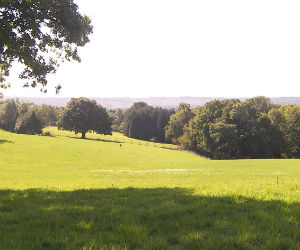My last interview in this particular series was with Prof. Nic Lampkin of the Organic Research Centre on the subject of policy and political challenges to agriculture.
As I have said before there are times when actually I would prefer to run off and be a hermit, not deal with other people and certainly not deal with politics or policy. In fact when I have listened to politicians in the past, I have sometimes wondered whether that politician and I occupied the same world (just as an example – a few years ago Owen Paterson had not heard of community supported agriculture, I’m not sure that it surprised me, but I was not impressed).
Others bravely confront the world of politics and agriculture and have done so in order to support constructive policy and make the world a better place. Nic Lampkin is certainly one of those individuals! So we sat down last Thursday morning to discuss political challenges to agriculture in the 21st century.
I had sent some questions to prepare the interview and in response Nic recommended that I take a look at his presentation on the ‘Role of Regulation in Organic Farming’ in Estonia to IFOAM EU. It was only 13 minutes long but it answered many of the questions I had sent. (the presentation can be found here) Hmmm. Then what do we talk about? Well here are a few highlights:
Organic as Open Source
Nic said that historically biodynamic and organic agriculture are ‘open source’ concepts. There has been continual input and refining of the principles of these approaches to agriculture because they were ideas that were the products not simply of one individual (not even biodynamics) but of many individuals who were combining their points of view, finding commonality and allowing both principles and practice to develop, well, organically (pun intended). That presents a serious difficulty for regulation. How is it possible to encapsulate principled and developmental approaches in regulation? Is it possible to continuously redefine and update regulation in response to experience? How can we keep this ‘open source’ quality when regulation seeks an easily assessible pass/fail approach?
Agroecology as learning process
Well I would love that idea wouldn’t I? Nic described involvement in agroecology as a continual learning process, not something ever finished, but always developing. Can regulation support this? If so, then we will have regulation which truly supports the impulse.
regulation that encourages positive development
A developmental approach is pretty common in the agroecological sector and regulation can be seen as a fossilising influence. But not necessarily. It should be possible that regulation can work as a support to development. Nic mentioned sustainability assessment tools as a support for farmers, something that can motivate farmers in the process of change.
He said that ‘it is vital that regulation and certification are not a ceiling that limit creativity and opportunity’ but a supportive platform from which to begin.
Make regulation an inclusive process
At the moment the process of developing regulation and policy is not as inclusive as it could be. By including the producers, processors, traders and (very importantly) consumers, regulation can become a collaborative experience, taking into account the principles and best practice of producers as well as the aims and expectations of consumers. Taking a well-rounded view of regulation is a bit like taking a well-rounded view of the farm, understanding it as an organism, not just a group of diverse enterprises.
change the conversation – from input to output
Traditionally organic agriculture has been viewed as the avoidance of certain inputs (chemical fertilisers, pesticides etc.) and has involved lists of what you may or may not use. Those lists are useful but they are really only a small part of the agriculture itself!
Agroecological impulses such as biodynamic and organic (among others) really involve both process and aims. In fact many of the aims are the same – regeneration of the soil, plant resilience, care for animals and their well-being, fairness to humans (in the work and the supply chain) – in fact working on the ecological/social/economic levels that are usually considered as the three pillars of sustainability. So if the aims are similar, how do we find the methods? According to Nic we look for ecological processes rather than technological ones. (mostly…)
By focusing on the aims, rather than the inputs we remember our sense of purpose and meaning in what we are doing, and we begin to take into account all of the benefits of this kind of farming! This is about producing food, but not only. It is also about all the things mentioned above, and those ‘public goods’ cannot be separated from the activity of producing food.
Also by recognising the commonality of aims, different streams within the agroecology remember how much they have in common. As Nic said almost 99% of our DNA we have in common and this DNA is really in the aims of the different streams. We have much more in common than separates us after all.
I have to admit that I never expected a conversation about policy and regulation to be so inspiring! But it most certainly was. These were all the right questions, talking of aims and aspirations – the confidence that regulation has its place, and can be a support, but also the confidence that agroecology is not just about producing food, it is much richer than that. So perhaps the conversation is not simple, the message is not a soundbite – but it is rich, inclusive and diverse! (signs of resilience!)




